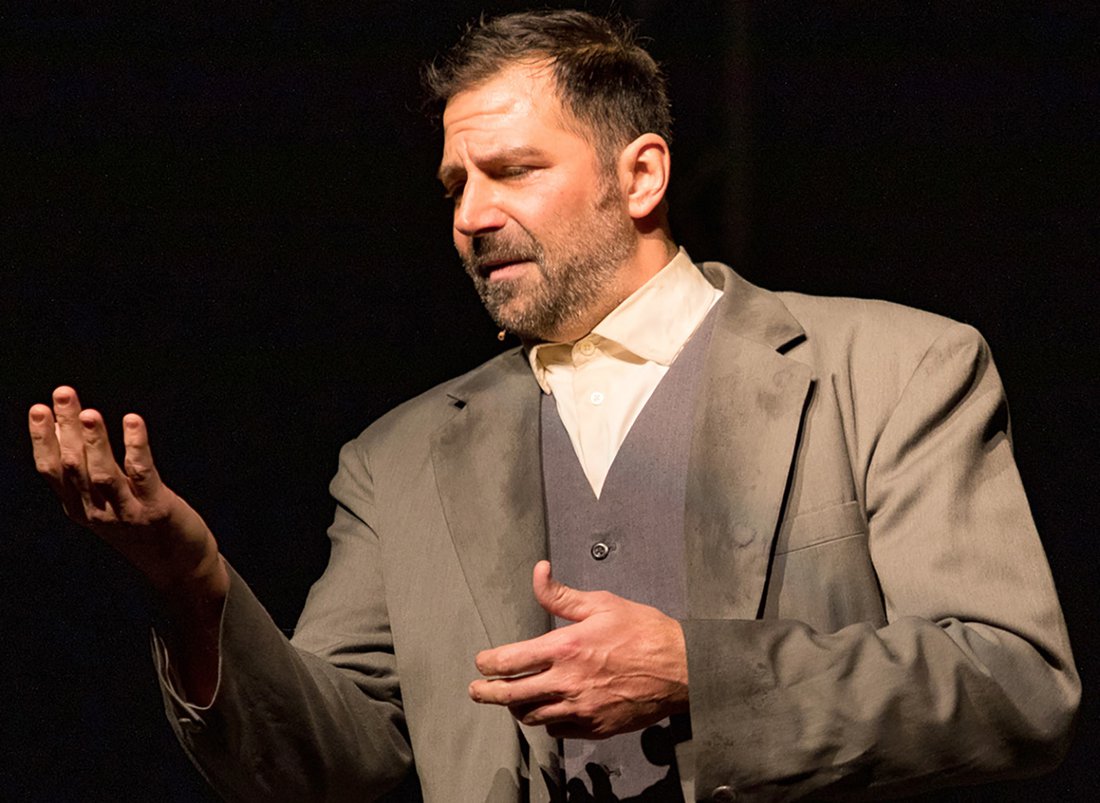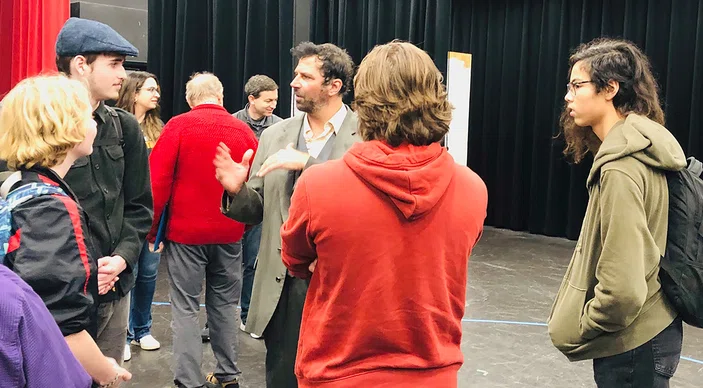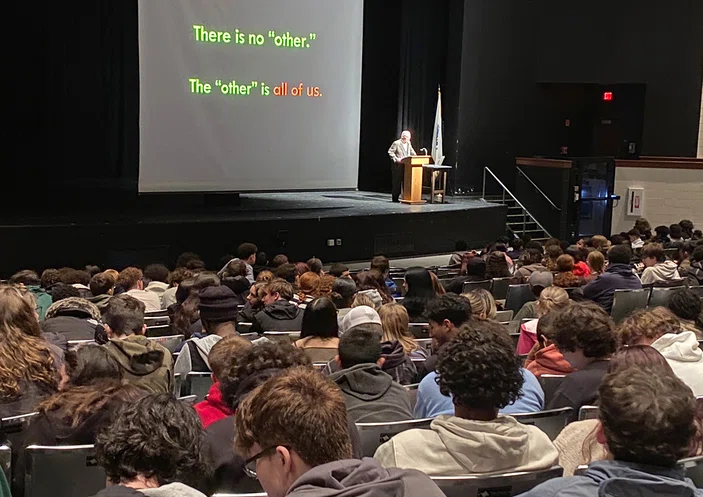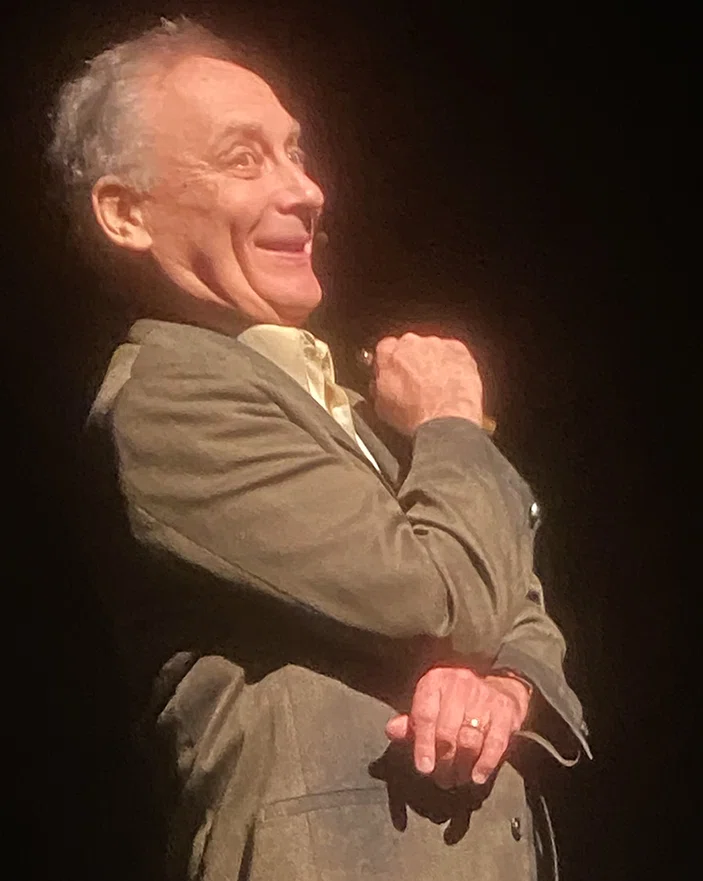
Teaching artist Elijah Alexander performs The Mitzvah Project in 2023. The unique learning experience uses the power of live theater to teach young people about the Holocaust and connect it to intolerance in our society today.
Project uses theater to teach students about the Holocaust
April 7, 2025
A Jewish man kneels on a train platform at Auschwitz. His arms stretched up high, he pleads to a Nazi officer looming over him, begging for his life.
This scene takes place not in 1943 Germany but on a stage at a high school in 2025.
It’s part of a unique learning experience called The Mitzvah Project, which uses the power of live theater to teach young people about the Holocaust and connect it to intolerance in our society today.
“It’s not the kind of thing that happens in school typically. We try to create an environment where young people can have more of an emotional experience,” said Roger Grunwald, founder of The Mitzvah Project.
The California-based program travels to high schools across the country to present a 60-minute Holocaust and social justice education program that includes a one-act solo play, a lecture and a discussion session. Since 2014, more than 17,000 high-school students have been part of the program, which is offered at no cost to public high schools and is subsidized by donors.
Students are prepared for the performance with a companion online study guide that gives them a primer on the Holocaust, the state-sponsored murder of six million Jews by the Nazi regime between 1933 and 1945. The lecture also connects the Holocaust to other instances of hate and prejudice in U.S. history, such as Jim Crow laws and the eugenics movement.
The performance and lecture are led by one of three teaching artists from The Mitzvah Project.
“These are working actors — from Broadway, the Royal Shakespeare Company, feature films and TV — each of whom also has a riveting personal story to tell about one of their own family members who survived the Holocaust,” Grunwald said.
He is one of them. Grunwald’s mother survived the Auschwitz concentration camp. After the war, she relocated to San Francisco and eventually started sharing her story in schools, as many Holocaust survivors have done. Following his mother’s death, Grunwald resolved to keep this tradition alive by leveraging the skills of actors to give young people an emotional learning experience that approaches what the first-person stories of Holocaust survivors did.
“The students can get a visceral experience of what that might have been like because these actors are so good at what they do,” Grunwald said. “They put the young people there.”
Following the dramatic performance, the teaching actors share their personal stories alongside family photos explaining the toll that Nazi imprisonment had on their family history. The lecture draws links between the experiences of Anne Frank with incidents of hate today, such as the 2020 killing of George Floyd. Students then have an opportunity to ask questions and reflect on the material. A teachers-only study guide provides suggestions for keeping the conversation going, including follow-up exercises like writing letters to the presenters.
According to online testimonials, students have called the experience life-changing and eye-opening.
“What I learned from your presentation is that it’s important to advocate for change. Sitting on the sidelines and waiting for change to happen is not enough,” wrote one student from Shaker Heights High School in Ohio. “The message I got from your wonderful presentation is the inspiration to do more in our society.”
Craig Bocks, assistant principal of San Ramon Valley HS, said The Mitzvah Project was a unique opportunity for his school, which hosted the program in 2023 and 2024.
“For any educator interested in bringing awareness about the dangers of oppression, both past and present, The Mitzvah Project is a powerful and impactful presentation,” he said.
Monte Vista High School Principal Dr. Kevin Ahern said the program had a profound impact on his students.
“Teaching artist Elijah Alexander brought the performance to life with powerful and authentic accounts of the Holocaust, immersing our students in the harsh realities of this historical tragedy,” Ahern said. “His lecture that followed provided our students with both the background of what gave rise to the Holocaust as well as an empowering message of what they can do to stand up to antisemitism, racism, or any other divisive language or systems.”
In a society that is growing more disconnected from the Holocaust — a 2020 survey found that nearly one in four young people in the U.S. between the ages of 18 and 39 believe the Holocaust was a myth or exaggerated — programs like The Mitzvah Project aim to share the truth about this dark chapter in history with young people and how they can prevent atrocities like this from happening again.
“The roots of prejudice that gave rise to the Holocaust are at the core of what we’re experiencing — the hate, the othering, the white supremacy in the United States. They’re integrally linked,” Grunwald said. “It’s important because we can help young people see ... the connection between what happened in the Holocaust and what’s happening today.”

Teaching artist Elijah Alexander speaks with students after a 2024 presentation of The Mitzvah Project at Northgate High School in Walnut Creek.

Mitzvah Project teaching artist Victor Tamadge fields questions from high school students during a lecture.

Teaching artist Victor Talmadge plays the part of The Chorus in The Mitzvah Project.




